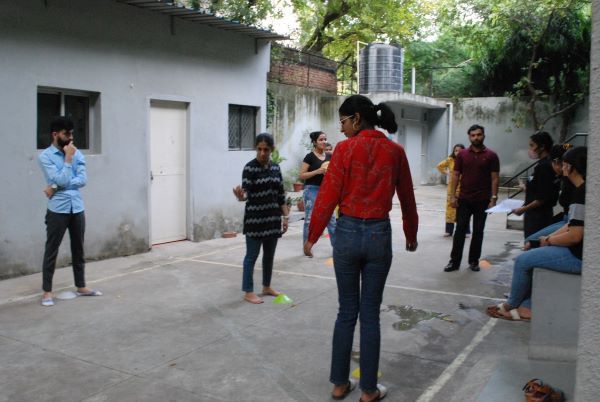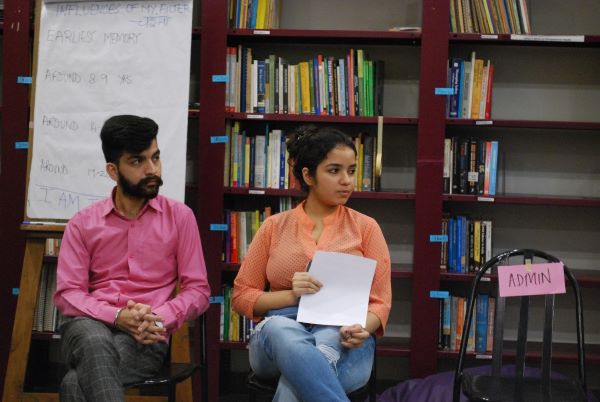This week at the fellowship program, fellows came to Delhi for a two-day (1st – 2nd October) residential workshop at PRIA. The first day started with a session on understanding Self in Everyday Life. This session was facilitated by Ms. Niharika Kaul and Ms. Yashvi Sharma to help fellows learn about the idea of multiple selves with a simple mask-making activity. During the session, fellows drew three masks based on their relationships with their peers, family members, and teacher/colleagues. Fellows were prompted to write phrases, adjectives, situations that define who they are in front of these people, how the fellows’ behavior changes, and how they present themselves to these different categories of people. Fellows were then encouraged to think about whether they were their true selves in these interactions with others and if this is the same way they portray themselves to everyone including, their families, friends, and colleagues. The concept of self in everyday life was then debriefed through Ervin Goffman's theory.
The next in line was the session on self and society. This session was facilitated by Dr. Rajesh Tandon. The session started with a small activity to learn about the use of senses, and how they are used for understanding things happening in the environment. This activity connected the idea of Self with Society. After this, fellows were introduced to the topic of power, inequality, and society. In this session, fellows discussed about different micro and macro aspects of society, economic development goals, and the range of social realities that exist in the country and locally in their immediate communities.
After this, the facilitators, Ms. Nikita and Ms. Niharika informed the fellows about community-based participatory research (CBPR). To give a hands-on experience of the methodology fellows, were sent to a nearby community to practice two CBPR tools - resource map and participatory safety audit (PSA). The activity enabled fellows to reflect around the ideas of community engagement, social issues, and people’s knowledge.

The first day ended by a session with Ms. Isha from Pro Sport Development on Physical Self. The physical self is an important component for understanding self. Young people either discriminate their peers or get discriminated against by their peers, based on their physical characteristics. Through the medium of sports and conversation around physical diversity, the facilitator helped fellows in becoming comfortable with their physical selves.

Day two started with a session on coping mechanisms, and feedback and disclosure. During the session, fellows were asked to reflect on the types of techniques they use for coping up with different situations. Fellows were divided into groups where they discussed their perceptions and other perceptions about themselves. Some of the fellows felt good about how others perceived themselves, while others got confused and started to reflect upon who they are?

The next in the learning journey was the session on Navigating Identities. It was an engaging session where the fellows were involved in a simulation activity. The conversations that took place during the activity were thought-provoking and led to conversations on social identities, marginalization, discrimination based on identities.

The day ended with a session on Stakeholder analysis facilitated by Dr. Kaustuv K Bandyopadhyay. In the next phase of the fellowship program, the fellows will start working on their social action projects, and thus, it was important to build an understanding of stakeholders. Fellows were given case study to learn steps for conducting stakeholder analysis.

With lots of discussion and sharing of experiences and learnings, the workshop ended with a discussion on the social action projects. The fellows will now be going back to Chandigarh and will be engaging with their local communities around the issues of their concerns.